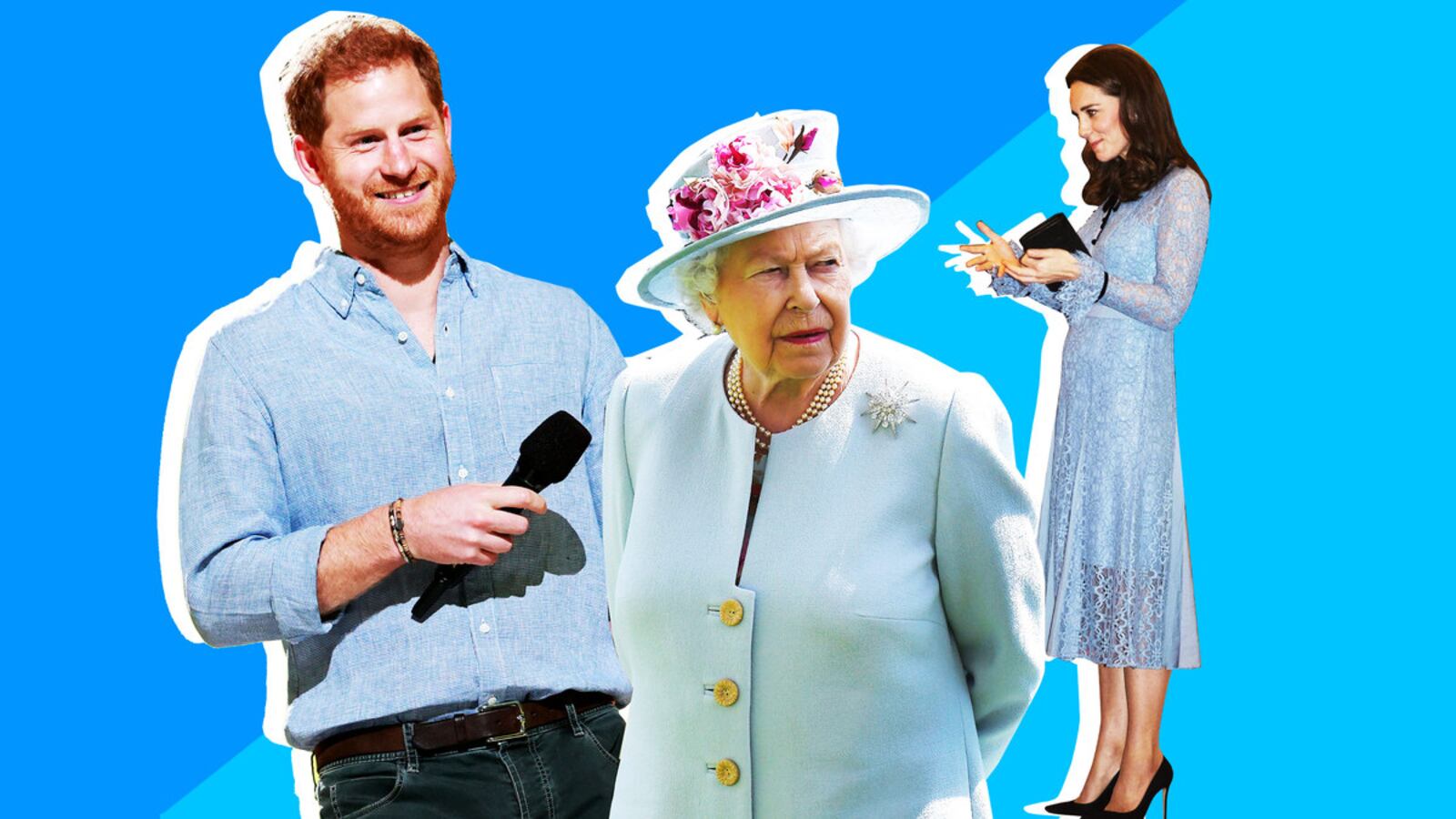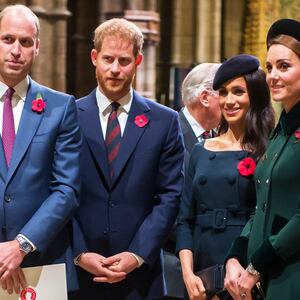If you love The Daily Beast’s royal coverage, then we hope you’ll enjoy The Royalist, a members-only series for Beast Inside. Become a member to get it in your inbox on Sunday.
At the beginning of a ballroom scene in Pose, indeed in the brief opening titles and its exploding pink graphic, the call goes up: “The category is…”
The phrase recurred to me this week thinking about the various grooves the royal family, and its talkative Californian dissidents Prince Harry and Meghan Markle, inhabit. In olden times, we called them “interests,” and the royals pursued them dutifully, cutting ribbons, opening hospital wards and country shows, accepting little bunches of flowers from children, and on to the next one.
Now, marketing-speak invades all. We talk about people operating within “spaces” that are theirs. These spaces seem edgier than those stilted ribbon-cuttings. Princess Diana changed the royal photocall when she—at the time controversially in the 1980s—took on AIDS as a piece of activism. Her children are following her lead, in very different ways.
These being polarized times, you will either think that Prince Harry this week in the Armchair Expert podcast had something worthwhile to say about mental health when he talked about wanting to “break the cycle” of inherited trauma within the royal family, or you will think he was throwing yet another stink bomb, this time at his father Prince Charles.
Maybe it’s a lot of both. One thing is clear: headlines and quotes do not convey a tone of voice, and at least in this podcast, Harry talks earnestly, not overtly maliciously, about his father, identifying what he sees as failures in his parenting too. The royals remain, as usual, publicly silent, while making their fury clear at his words in private briefings. One royal aide told the Telegraph of Meghan and Harry: “For a couple that has been at pains to set out their compassionate principles, they seem woefully lacking when it comes to their own family.”
“Isn’t life about breaking the cycle?” Harry told the podcast. “There’s no blame. I don’t think we should be pointing the finger or blaming anybody." But then he did precisely that. “Certainly, when it comes to parenting, if I’ve experienced some form of pain or suffering because of the pain or suffering that perhaps my father or my parents had suffered, I’m going to make sure that I break that cycle, so that I don’t pass it on basically,” Harry said. “There’s a lot of genetic pain and suffering that gets passed on anyway. As parents we should do be doing the most we can to try and say, ‘You know what, that happened to me, I’m going to make sure that doesn’t happen to you.’”
“Piecing it all together,” said Harry about trying to figure out his father Prince Charles, “this is where he went to school (Gordonstoun, which Charles hated), this is what happened. I know this bit about his life. I also know that’s connected it to his parents. So that means that he’s treating me the way that he was treated, which means how can I change that for my own kids? And well, here I am. I’ve now moved my whole family to the U.S. That wasn’t the plan. Sometimes you’ve got to make decisions, and put your family first and your mental health first.”
“It’s a mixture of The Truman Show and being in a zoo,” Harry said of growing up royal. The U.K. media feel they own the royals, Harry said, noting there was a lack of sympathy for the royals because they’re privileged.
He talked about the “feeding frenzy” that greeted his and Meghan’s move to Los Angeles.” Harry said he had not acknowledged losing his mother at 12 and other traumatic experiences had affected him, until he thought, “Perhaps I need to process this, because if I don’t, how the hell am I going to be a decent father to my son and daughter?”
The reaction to Harry’s words on the podcast sharply contrast as usual—wholehearted support, scornful criticism, royal anger—just as they have since the publication of Finding Freedom: Harry and Meghan and the Making of a Modern Royal Family, and the depth-charge Oprah Winfrey interview—the first Oprah interview that is in which Meghan talked about a member of the royal family who queried the darkness of the then-unborn Archie’s skin, and how the family allegedly failed Meghan when she felt suicidal.
Harry will continue to speak about himself, alongside Winfrey and other celebrities in The Me You Can’t See on Apple+ TV, debuting May 21. “The majority of us carry some form of unresolved trauma, loss, or grief, which feels—and is—very personal,” Harry has said. “Yet the last year has shown us that we are all in this together, and my hope is that this series will show there is power in vulnerability, connection in empathy, and strength in honesty.” The show “will prove you are not alone,” Harry told the podcast.
The “category” for Meghan and Harry is mental health and wellness. It is also challenging a media and social media they feel is dysfunctional and dangerous—and two poisonous organisms they have long felt under attack by.
If we look to Britain, the royals carry on as normal; their longtime categories unchanged. In the last week, Queen Elizabeth opened parliament, emerging from her private grief over the death of Prince Philip. Prince William and Kate Middleton went to a youth project in matching navy outfits. Earlier in the week, Kate left copies of her new book, with messages left inside, all over Britain.
They too are dedicated to mental health work, helping kids, and have been widely praised for their work supporting health care workers during the COVID pandemic. For their recent 10th wedding anniversary, a glossy film celebrating family was cutely done. William and Kate are doing what they can to redraw royal boundaries within convention.
Naturally, Prince Charles hues closer to convention. He was asked by a reporter about Harry’s podcast comments this week about his parental failures, and predictably ignored it. For him, it is now not new for his younger son to make whatever it is public; Harry spoke about their fractured relationship to Winfrey.
Since that interview, there has been the usual briefing and counter-briefing about royals feeling stung by Harry and Meghan’s words and accusations, and their making private conversations public. A shared moment between brothers at Prince Philip’s funeral appears to have been glancing, rather than a reconciliatory stepping stone. All parties have retreated to their spaces—personal and professional—that feel safest and most effective to them. And, as his words to the podcast make clear, Harry’s royal family-based pain runs deep.
“She could tell that I was hurting and that some of the stuff that was out of my control was making me really angry,” Harry told the podcast of what Meghan had seen in him, which led him to have therapy. He talked about three moments in his life when he felt most helpless, one of which was being pursued by the paparazzi in a car with his mother.
“I don’t want to be here. I don’t want to be doing this. Look what it did to my mom,” he recalled thinking in his mid-twenties. How could he even think of settling down with a wife knowing how the royal family worked. He set out to “make this different”—meaning the institution and path expected of him—which is where the impetus for the Invictus Games came from, and the new life he is building with Meghan in California.
Harry thinks sharing his stories of struggling with mental health issues is the most powerful thing he can do. “It’s about sharing your story, knowing how relatable it is, because I guarantee you by sharing the vulnerabilities and experiences that you have had growing up” that “you’re going to have a positive impact on someone’s life.”
This may be true, but Harry’s focus on mental health is part of a more general trend; celebrities routinely turn up on TV talk shows to talk about their mental health now, saying pretty much the same as him. It is a strange mixture of genuine, heartfelt, and yet also an integral part of modern celebrity branding.
“Certain corners of the media, it’s very much like, ‘You’re privileged. How could you possibly be suffering?’” Harry said. That isn’t the whole story of why certain sections of the media are critical of Harry and Meghan—they also object to their perceived self-absorption, and whining sense of victimhood. This is evident in the podcast too, in which Harry complains about all the public attention they get—apart of course from the public attention they court themselves by doing podcasts or interviews with people who are sympathetic to them.
The presenters of the podcast agree with most of what Harry says. If he hates the media and social media so much, why participate in it? If privacy means so much to him and Meghan, why do they not fully embrace it and find whatever peace they want well away from the forces that they despise? Instead, they keep commanding headlines via platforms which allow them to express themselves, mostly unchallenged.
But they also need to sell themselves. And choosing the most non-critical means to do so is an inevitable re-appropriation of power after a childhood where Harry says he was told of the media, “You have to accept what they say about you.” He said he was told not to complain, or the media would just attack him more. Now, he wants to stick it to the tabloid media, which he clearly loathes, on his own terms.
The podcast shows how animated Harry is; he feels “more free” at least in California. He joked that, when younger, he watched royal movies to keep his echo chamber intact. But strangely, he has—by completely understandable choice, and sense of relentless persecution—ended up in an echo chamber of his own making and choice. It would be amazing to hear in any one of these interviews somebody make a non-assholishly expressed criticism of Harry, and see how he responds to it.
The royal family, beyond negative briefing and grumbling sources, cannot seem to effectively counter, or even participate in the conversation Harry is having. It does not communicate like Harry, either in public or private, and Harry is clearly enjoying the throwing off of shackles, as his family continue to wear the shackles of stifling convention he identified them wearing so helplessly to Oprah Winfrey. Harry, his critics might argue, knows the power and damage the words may do to his loved ones. But the passion of his words in his podcast is also genuine.
That passion is reminiscent of Diana, striking out on those AIDS wards, absolutely against royal convention. Back then, she held the hands of those who were so stigmatized and feared, an image of her touching them, skin to skin, did more to dispel prejudice than any misfiring public health education campaign of the time.
Diana was a radical, she tried to rewrite a set of royal rules, and more profoundly a royal way of being—just like her sons are, one conservatively and one radically. Wherever Harry and William are heading, Diana would have approved. She would also likely have wished they could have been closer while doing it. The one category that mother and sons all share is “Change.”







